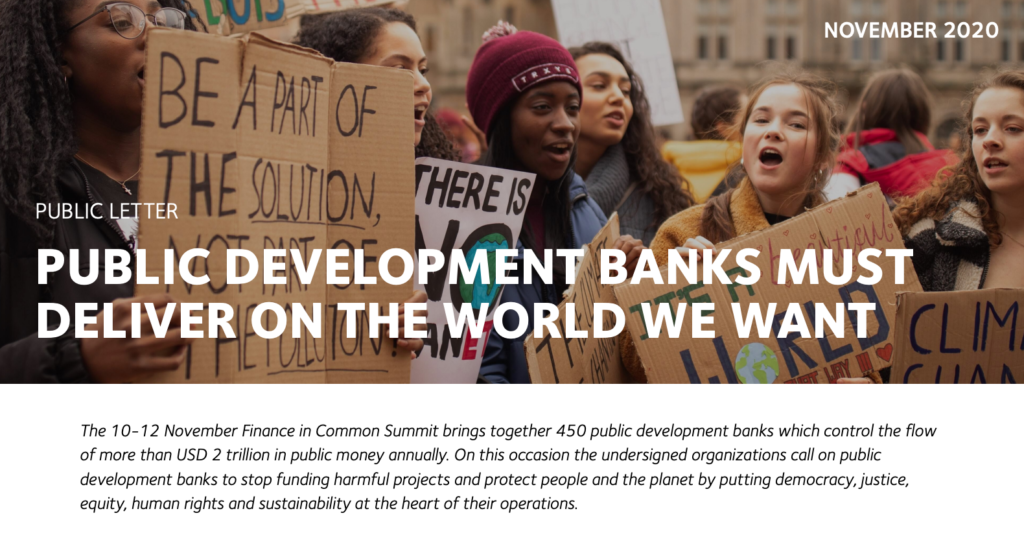Finance in Common Joint CSO Statement
11 November 2020

Posted as an op-ed article here: https://news.trust.org/item/20201109103303-glxq3
Full CSO statement uploaded here: https://forus-international.org/en/resources/193
The world faces the gravest global health crisis in a century, intertwined with the rising social and economic inequality, the sixth mass extinction of species and record-breaking ecological and climate disasters. Against this backdrop of global upheaval, we call on public development banks meeting this week for the Finance in Common Summit to become part of the solution towards building a just, equitable, inclusive and sustainable world.
To do so, they must commit to devoting their considerable financial resources and influence to achieving a safe, healthy and prosperous future for all. That is why today more than 320 civil society organisations signed a joint letter urging the public development banks gathered at the summit to transform their financing models.
The COVID-19 pandemic is only the latest example of the multi-faceted crises our societies are confronted with and which could push 150 million more people into extreme poverty by 2021. It is time to address the root cause of such systemic crises, otherwise we risk dramatically increasing the plight faced by billions of people.
Women and girls, as well as those experiencing the cumulative impacts of various vulnerabilities, are affected the most and worst. Whatever the duration of this pandemic, the challenges the world is facing deserve global answers to meet the needs of local communities.
Public development banks should not repeat the mistakes of the past. They must seize the opportunity of the Finance in Common Summit to initiate a deep and rapid shift in the way they operate and place democracy, inclusiveness, equality, solidarity, and the common good at the core of their actions.
Public money should only be spent to promote the wellbeing of people and the planet. Not a single penny can go towards the violation of human rights, economic, social and cultural rights, or the rights of Indigenous Peoples, nor should it allow for the destruction of nature.
It is time public banks take a collective stand to stop money going towards fossil fuels and other sectors that fuel the climate and biodiversity crisis. We believe that achieving the Sustainable Development Goals, limiting global warming to 1.5°C by fully implementing the Paris Agreement and protecting nature should be the key drivers of action over the coming decade.
Through a rights-based approach and strong mechanisms for meaningful participation of civil society at all stages, from the development of policies to the evaluation of their impacts, public development banks should enhance the respect of human rights and promote community-led development.
Their direct and indirect operations should promote resilience-building and the development of essential and qualitative public services, support anti-corruption and anti-tax-avoidance efforts, and adhere to a “do-no-harm” principle so that their financing does not undermine climate and environmental objectives, increase the burden of debt, or expand inequalities.
To ensure accountability, the highest transparency standards, reporting guidelines, and risk and impact assessment methodologies must be applied by all public development banks and their intermediaries.
The current context is dire and highlights yet again the urgency of rethinking development finance. It requires thinking one step ahead; it’s not only about how public money is being spent, it also means addressing the largely negative impacts that public-private partnerships have on communities.
These efforts must be supported by countries providing the right mandate, policies, measures and the necessary resources to public financial institutions.
The public development banks gathered at the summit should act immediately to transform their financing models, by adopting the commitments set out in our joint letter. Their public interest mandate must be clear, their governance transparent and accountable.
Civil society will continue to play its part to ensure that the response to the current global economic crisis brings economic, social and ecological transformation. If not now, when?
This oped was authored by Iara Pietricovsky de Oliveira, president of the International Forum of NGO Platforms (FORUS), Eléonore Morel, chief executive officer of the International Federation for Human Rights (FIDH) and Tasneem Essop, executive director of the Climate Action Network.

